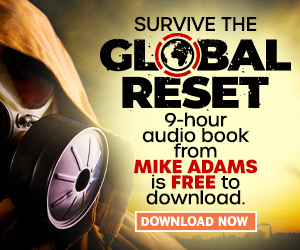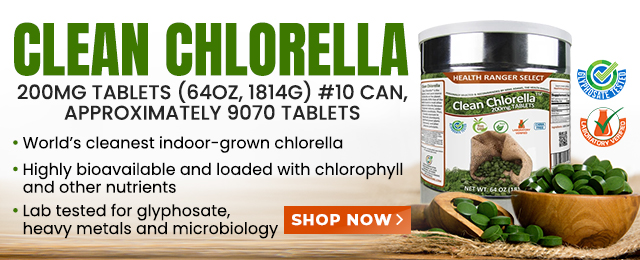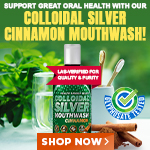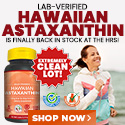
Oceans are teeming with undiscovered microbes
Wednesday, August 02, 2006 by: NewsTarget
Tags: life sciences, ocean ecosystems, microbiology
- Warp Speed 2.0: Trump Administration ACCELERATES Gates-funded, self-amplifying bird flu vaccines
- DMSO and Natural Dyes: A suppressed cancer treatment resurfaces in independent research
- Transhuman vectors of disease: Young adults continue to produce spike proteins ONE YEAR after receiving COVID vaccine
- Chemical cocktails in processed foods linked to diabetes, validating natural health warnings
- Study finds bananas more effective than salt reduction for lowering blood pressure
- 8 U.S. states may EXPAND vaccine exemptions in 2025, and parents have many reasons to STOP THE SHOTS
- Prominent doctors call for new holistic therapies to address CANCER SPIKE: Tree barks provide anti-cancer treatment options
- Aerosolized bioweapons? Strange “diploid biomasses” falling out of the sky in Florida captured under the microscope
- STAGING BEFORE RELEASE: WHO Runs 2-Day Pandemic Simulation 'Exercise Polaris'
- Fermented foods like sauerkraut may outshine modern medicine in gut health, research finds
- Ancient mummies rewrite human history with “ghost” lineage discovery
- Surge in KIDNEY FAILURES linked to common medications
- Fauci is back in the limelight, and he’s busy promoting a future COVID or FLU pandemic
- Mike Adams releases country western hit single: Goin’ Back in Time is Comin’ Home
- Millions of gun owners could be challenged in court and lose their firearms if DOJ doesn’t step in to stop crazy ATF rule
- Analysis: The coming economic collapse, a mass uprising and Trump's three secret weapons to halt the growing revolt
- Widespread social and economic unrest: Steve Quayle issues urgent financial warning of imminent asset collapse in new interview with Mike Adams
- Israeli lobbyists boast of controlling US national security policy in leaked AIPAC audio
- Israeli lobbyists boast of controlling US national security policy in leaked AIPAC audio
- Aerosolized bioweapons? Strange “diploid biomasses” falling out of the sky in Florida captured under the microscope
- Analysis: The coming economic collapse, a mass uprising and Trump's three secret weapons to halt the growing revolt
- Fauci is back in the limelight, and he’s busy promoting a future COVID or FLU pandemic
- Widespread social and economic unrest: Steve Quayle issues urgent financial warning of imminent asset collapse in new interview with Mike Adams
- Kiss Your Genetic Privacy Good-Bye! 23andMe Gets Green Light to Sell Your Intimate Genetic Details to Anyone They Want
- Mike Adams releases country western hit single: Goin’ Back in Time is Comin’ Home
- U.S. lawmakers investigate Meta over alleged China collaboration
- Tulsi Gabbard leads charge against the Biden regime’s global censorship of the 'Disinformation Dozen'
- Pfizer's RSV vaccine linked to preterm births as drug giant CONCEALED RISKS from pregnant women in unethical clinical trials
- Dane Wigington exposes climate engineering as ‘All-Out Weather and Biological Warfare’
- Shedding light on the dark side of MMR vaccines: How vaccinated individuals SPREAD MEASLES & put the vulnerable at risk
- TAKE IT DOWN Act advances in Congress amid free speech concerns
- CLOT SHOT PLANDEMIC UNFOLDING: Fibrous, rubbery clots caused by covid injections have prion-like seeding activity
- Chemtrails unveiled: How the CIA and Big Business are manipulating the weather for profit
- Curcumin’s ancient healing power supercharges muscle recovery, and its effects are compounded with anti-inflammatory foods and supplements
- Criminal referral requests filed against Fauci and top COVID officials in seven states
- Defunding DEADLY mRNA jabs: Government funding for mRNA technology being scrutinized and sidelined until proven "safe and effective" for real
- Newly released JFK files reveal Pentagon's role in creating Lyme disease and covid in the same lab
- Analysis: The coming economic collapse, a mass uprising and Trump's three secret weapons to halt the growing revolt
- Mike Adams releases country western hit single: Goin’ Back in Time is Comin’ Home
- Aerosolized bioweapons? Strange “diploid biomasses” falling out of the sky in Florida captured under the microscope
- Kiss Your Genetic Privacy Good-Bye! 23andMe Gets Green Light to Sell Your Intimate Genetic Details to Anyone They Want
- European Court of Justice: Healthcare professionals who promoted or administered COVID-19 vaccines are CRIMINALLY LIABLE for any harm caused
- Federal employees whine over DOGE's new directive requiring them to do a 5-point summary of weekly accomplishments
- Widespread social and economic unrest: Steve Quayle issues urgent financial warning of imminent asset collapse in new interview with Mike Adams
- U.S. approves new Russian ambassador as diplomatic thaw continues
- Government waste exposed: Hegseth supports Musk’s demand for accountability from federal workers
- Now you can HEAR chemistry: Health Ranger translates molecules into music in stunning video demonstration that will blow your mind (and your ears)
- Fauci is back in the limelight, and he’s busy promoting a future COVID or FLU pandemic
- CLOT SHOT PLANDEMIC UNFOLDING: Fibrous, rubbery clots caused by covid injections have prion-like seeding activity
- I Want My Bailout Money – new song released by Mike Adams
- I Want My Bailout Money – new song and music video released by Mike Adams
- Tulsi Gabbard leads charge against the Biden regime’s global censorship of the 'Disinformation Dozen'
- Trump administration poised to overhaul crypto regulations with new SEC leadership
- The Health Ranger releases “Vaccine Zombie” song and music video, using AI-animated zombies for the music video
- Red Cross issues warning to stop blood plasma donations from vaccinated people
- Scientists confirm: GENIUS brain function can be spontaneously unleashed in humans without any apparent cause
- EPA advisor admits the agency is funneling billions to climate groups ahead of Trump’s return to White House
- HYSSOP: What research reveals about the health benefits of this ancient holy herb
- Two containers with completed ballots fall out of truck in Florida
- Newly released JFK files reveal Pentagon's role in creating Lyme disease and covid in the same lab
- Global leaders unite to clamp down on “misinformation” with UN-backed Cascais Declaration
- Mike Adams releases country western hit single: Goin’ Back in Time is Comin’ Home
- BREAKING: 2025 NDAA authorizes mandatory military draft of WOMEN across America… as Pentagon pursues global NUCLEAR war with both Russia and China at the same time
- Michael Yon warns of a ZIONIST TAKEOVER in Trump’s second administration
- The Health Ranger releases “Vaccine Zombie” song and music video, using AI-animated zombies for the music video
- Ozempic and Wegovy weight loss drugs are injectable LIZARD VENOM PEPTIDES that may unleash a devastating wave of organ failure… side effects align with symptoms of SNAKE BITES
- BOMBSHELL: DNA testing kits are a SCAM to develop ethnic-specific bioweapons
- Israeli soldiers accused of even more torture and abuse in the West Bank
- I Want My Bailout Money – new song released by Mike Adams
- These 13 countries just signed an agreement to engineer a global FAMINE by destroying food supply
- NASA admits that climate change occurs because of changes in Earth’s solar orbit, and NOT because of SUVs and fossil fuels
- RFK Jr. clears key hurdle: Sen. Susan Collins backs controversial HHS nominee, signaling a new era for health policy
Through the use of a DNA technique called 454 tag sequencing, researchers working on the International Census of Marine Microbes -- part of a 10-year plan which aims to catalogue marine species before the oceans are depleted -- found more than 20,000 kinds of microorganisms in a single liter of seawater. The water was expected to contain between 1,000 and 3,000 organisms.
Previously, molecular studies estimated that more than 500,000 kinds of marine microorganisms existed, but Dr. Mitchel Sogin, director of the Marine Biological Laboratory in Massachusetts, said these new results "blow away all previous estimates of bacterial diversity in the ocean."
While only 5,000 marine microbes have been named and formally described by scientists, Sogin said these new findings mean that there could be between 5 million and 10 million bacterial species in the world's oceans.
Scientists say these organisms are crucial to life on earth. "Microbes constitute the vast majority of marine biomass, and are the primary engines of the Earth's biosphere," Sogin said. "They are the oldest life forms, the primary catalysts of energy transformation, and fundamental to the biogeochemical cycles that shape our planetary atmosphere and environment."
###
Life sciences at FETCH.news
Get independent news alerts on natural cures, food lab tests, cannabis medicine, science, robotics, drones, privacy and more.
Take Action: Support Natural News by linking to this article from your website
Permalink to this article:
Embed article link: (copy HTML code below):
Reprinting this article:
Non-commercial use OK, cite NaturalNews.com with clickable link.
Follow Natural News on Facebook, Twitter, Google Plus, and Pinterest
Science News & Studies
Medicine News and Information
Food News & Studies
Health News & Studies
Herbs News & Information
Pollution News & Studies
Cancer News & Studies
Climate News & Studies
Survival News & Information
Gear News & Information
News covering technology, stocks, hackers, and more



"Big Tech and mainstream media are constantly trying to silence the independent voices that dare to bring you the truth about toxic food ingredients, dangerous medications and the failed, fraudulent science of the profit-driven medical establishment.
Email is one of the best ways to make sure you stay informed, without the censorship of the tech giants (Google, Apple, Facebook, Twitter, YouTube, etc.). Stay informed and you'll even likely learn information that may help save your own life."
–The Health Ranger, Mike Adams













































